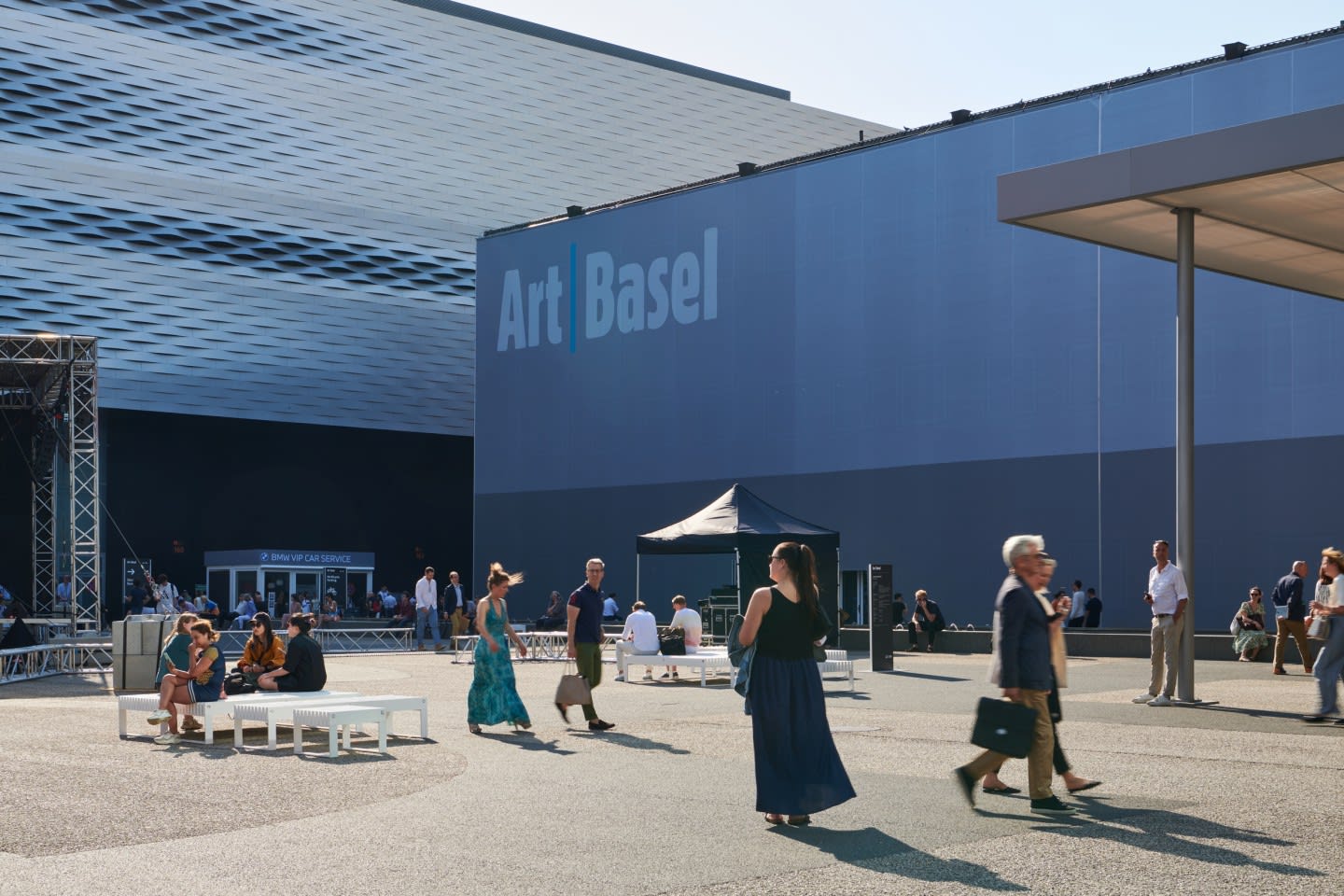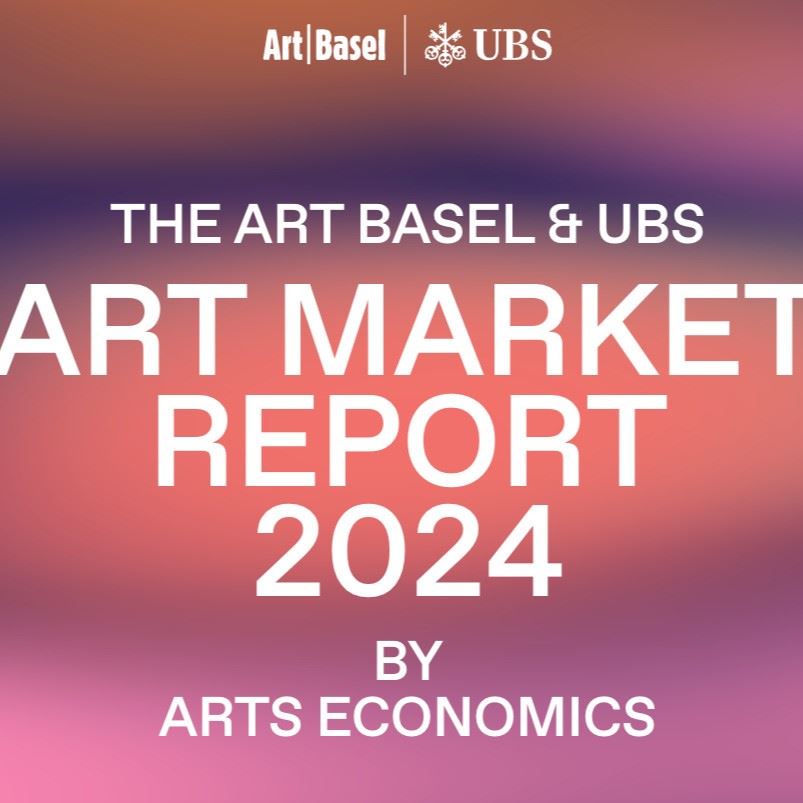For those who view the art world as nothing less than a reflection of the society we live in, there's much to ponder.
According to the eighth Art Basel/UBS report, released earlier this month, the sector underwent a series of upheavals in 2023 due to ongoing global and geopolitical changes. Specifically, the art market saw a 4% contraction compared to 2022, bringing the total value of transactions from $67.8 billion to $65 billion.
Though not dramatic, this decline has sparked interest and questions about the future of the creative industry. The challenges faced in 2023 were manifold and complex: inflation, social tensions, and economic uncertainties cast a shadow over the sector, leading to a reduction in sales, especially of high-value works, i.e., those exceeding $10 million.
The survey, as always conducted by Clare McAndrew, chief economist at the research firm Arts Economics, analyzed a sample consisting of over 500 auction houses and 1,600 independent galleries and art dealers, considering their 2023 turnover and posing specific questions to them. The reversal of the trend compared to the post-pandemic growth was particularly evident in major cultural centers such as the United States and the United Kingdom, where a significant decrease in transactions was recorded. In the USA, specifically, the national art market experienced a 10% contraction.
New York remains the global capital of sales, especially of so-called blue-chip works, but it too saw an overall reduction in exchanges, a sign of an atmosphere of uncertainty and caution among collectors and investors. In particular, High Net Worth Individuals have expressed the greatest reservations: concerns stemming first from the Russo-Ukrainian conflict and then from the situation in the Middle East have affected their ability to maintain a certain level of wealth in the medium term, leading to a reduction in spending. Overall, the United States continues to dominate the global market.

The United Kingdom also saw a decrease in sales, attributed in this case not only to economic factors but also to issues related to Brexit and its bureaucratic changes. Imports of fine arts and antiques decreased by 16%, and apparently, the British government has announced in recent days its intention to remedy the situation by facilitating legal procedures. In London, the second most important city globally for sales of high-value works, the situation is worse than it was pre-pandemic. The total market fell by 8% in 2023, below 2019 levels.
However, even in other key nations such as France, the fourth-largest market in the world, a 7% decline was recorded. Nor do China and much of Asia make exceptions, with Japan and South Korea experiencing declines, although the People's Republic showed signs of recovery in early 2023 due to post-pandemic spending, the restrictions of which ended much later. In fact, sales had increased by 9% annually before the real estate crisis and other signs of economic instability cast shadows over the sector. Apart from Chinese land difficulties, a good thermometer of the current situation will be the analysis of transactions at Art Basel Hong Kong, scheduled from March 28th to 30th, 2024.
Despite current challenges, the report still offers an optimistic outlook for the future: when historical series regarding the sector's performance over the past fifteen years are analyzed, growth and declines that have alternated over time become immediately apparent. Furthermore, overall, auction sales have decreased more than those of medium-level galleries, which have seen an increase in global trade volume. A surprising fact for many is that this suggests there are still opportunities for growth and development in the art sector. However, rising fixed costs remain a concern for such operators, and it suggests that it will take time for a complete rebalancing, primarily due to rising interest rates and inflation.
As for online sales channels, despite the decline from the peak of 2021, these remain a significant component of the market, indicating a trend towards digitization. In conclusion, the eighth Art Basel/UBS report highlights a contraction in sales of high-value works that has significantly influenced the composition of the sector, leading to greater attention towards medium-level transactions. This change provides greater space for galleries and emerging artists who may find new opportunities in an evolving landscape.
Finally, the report underscores the importance of innovation and adaptation in the art sector. While economic and geopolitical challenges can lead to periods of contraction, there is room for creativity and resilience. Art has shown throughout history that it can thrive even in difficult times, and 2023 was no different. What matters now is a thorough understanding of trends and the ability to quickly adapt to a constantly changing environment.
 Born in Genoa, Milanese by adoption, Elisabetta Roncati decided to combine her university education in economics and management with her passion for culture with a goal: bringing people closer to the art market in a clear, easily understandable and professional way. Interested in all forms of artistic and cultural expressions, contemporary and otherwise, she has two great passions: textile art and African art. As an art consultant, she firmly believes that culture has the power to transcend the boundaries of individual nations, creating a global community of art lovers. In 2018 he founded the registered trademark Art Nomade Milan that she uses to speak about art and culture on the main social media platforms.
Born in Genoa, Milanese by adoption, Elisabetta Roncati decided to combine her university education in economics and management with her passion for culture with a goal: bringing people closer to the art market in a clear, easily understandable and professional way. Interested in all forms of artistic and cultural expressions, contemporary and otherwise, she has two great passions: textile art and African art. As an art consultant, she firmly believes that culture has the power to transcend the boundaries of individual nations, creating a global community of art lovers. In 2018 he founded the registered trademark Art Nomade Milan that she uses to speak about art and culture on the main social media platforms.





 This site uses anonymous technical cookies to ensure navigation and third-party cookies to monitor traffic and to offer additional services such as viewing videos or messaging systems. Without third-party cookies some pages may not work properly. Third-party cookies can track your activity and will only be installed by clicking on the "Accept all cookies" button. You can change your selection at any time by clicking on the "Cookie" link on each page at the bottom left. By clicking on one of the two buttons you declare that you have read the privacy policy and to accept the conditions.
This site uses anonymous technical cookies to ensure navigation and third-party cookies to monitor traffic and to offer additional services such as viewing videos or messaging systems. Without third-party cookies some pages may not work properly. Third-party cookies can track your activity and will only be installed by clicking on the "Accept all cookies" button. You can change your selection at any time by clicking on the "Cookie" link on each page at the bottom left. By clicking on one of the two buttons you declare that you have read the privacy policy and to accept the conditions.